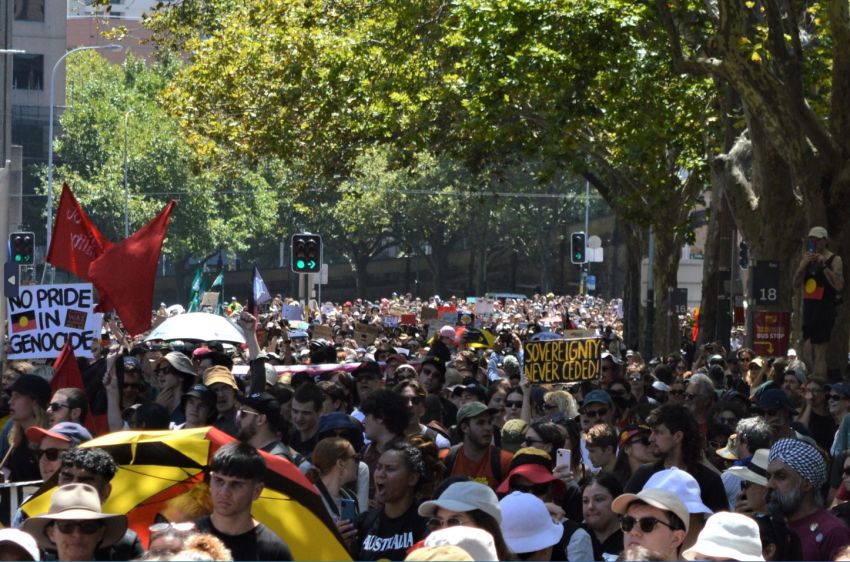
The official Yes and No cases on the Voice to Parliament referendum, published by the Australian Electoral Commission (AEC) on July 18, reveal just how little Anthony Albanese’s flagship constitutional reform has to offer First Nations peoples’ struggles for justice.
The AEC will distribute the two cases to all voters before the referendum. However, we will not be sent a progressive No case, as advocated by independent First Nations Senator Lidia Thorpe and other militant First Nations activists, including Gary Foley, Michael Anderson, Nala Mansell, Michael Mansell, Jenny Munro, Barbara Flick, Elizabeth Jarrett, Wayne Wharton, Marianne Mackay and Megan Krakouer.
The Blak Sovereign Movement has published its own progressive No case.
The official No case scrapes the bottom of the barrel for non-existent evidence that the proposed constitutional change will be legally risky, have unknown consequences and be divisive and permanent.
Its charge that this is “the biggest change to our Constitution in our history” is nakedly hostile to First Nations activism and activists. From beginning to end, it is an exercise in scare-mongering that plays to a deep-seated racism in Australia.
The Yes case says the Voice will simply be an advisory body that “will not have the power to prevent, delay or veto laws or decisions”. In addition, it says it will save billions of “taxpayer money” from spending on “failed” programs to close the gap.
The No case expressly rejects First Nations sovereignty, but the Yes case also rejects it — by deliberate omission.
While the Yes case claims the Voice proposal came from the popular 2017 Uluru Statement from the Heart, that statement called for constitutional recognition of First Nations sovereignty that “has never been ceded or extinguished, and co-exists with the sovereignty of the Crown”.
However, the government’s expert committee that came up with the wording for the proposed constitutional change for the referendum made sure it would not confer any “rights” — much less “special rights” — to First Nations people.
The Voice was to be limited to making representations to parliament or government — “an opportunity available to any individual or organisation”.
Therefore, any constitutional recognition this proposal might lead to will be token — like the recognition of First National peoples already inserted into the constitutions of Victoria (2004), New South Wales (2010), Queensland (2010), South Australia (2013), Western Australia (2015) and Tasmania (2016).
The Victorian and NSW constitutions do not confer any legal rights (clauses were inserted that stated that recognition did not confer any rights or affect any laws). But they do recognise Aboriginal and Torres Strait Islanders as the “first peoples of this land” and its “traditional custodians”.
Labor’s proposed federal constitutional provision is only to recognise "Aboriginal and Torres Strait Islander peoples as the First Peoples of Australia”. The proposed Voice will therefore be another federal First Nations advisory body, albeit one “enshrined” in the Constitution.
But what is this “enshrinement” worth? Will it prevent future governments from getting rid of the Voice should it prove to be too radical in its composition or proposals?
Bob Hawke’s Labor government abolished the National Aboriginal Consultative Committee/Conference (NACC) in 1985 and John Howard’s Coalition did the same, with Labor’s support, to the Aboriginal and Torres Strait Islander Commission (ATSIC) in 2005. First Nations people directly elected both the NACC/NAC and ATSIC and hence there was a contest of legitimacy when these bodies stood up to the government of the day.
This is unlikely to occur with the proposed Voice amendment which states: “The Parliament shall, subject to this Constitution, have power to make laws with respect to matters relating to the Aboriginal and Torres Strait Islander Voice, including its composition, functions, powers and procedures.”
The proposed constitutional enshrinement of the Voice would not stop a future government from radically narrowing its functions and reducing its funding, if it wants to prevent it from functioning.
As the law to create the Voice is yet to be revealed, the right-wing No case is using this to suggest that it might be given undeclared powers. In response, the leading advocates for the Yes campaign are stressing that its ambit will be very restricted, that it will only be “advisory” and that it will have no right to veto anything.
Minister for Indigenous Australian Linda Burney has even said that the Voice would not be advising on changing the date for “Australia Day” — Invasion Day to those committed to truth-telling.
Advocates for the conservative No case have made much of the fact that the proposed constitutional change says the Voice “may make representations to the Parliament and the Executive Government of the Commonwealth on matters relating to Aboriginal and Torres Strait Islander peoples”, as if it had the status of a First Nations chamber of parliament.
But this is scare mongering.
Norway, Sweden and Finland have established Sámi parliaments (with advisory powers except in relation to cultural practices and international representation). This is not what is being proposed here.
However, if implemented, Labor’s proposal will for the first time establish a First Nations body that can officially advise federal parliament. Of course, the parliament, like the government, can accept or dismiss such advice.
Progressive No advocate Michael Mansell has called for reserved First Nations seats in the Senate (a bit like Maori people have in the Aotearoa/ New Zealand parliament). He argues that would be a better way of ensuring First Nations voices in parliament.
The No campaign opposes the mounting movement to recognise First Nations sovereignty — demonstrated by the growing Invasion Day marches — and hence the beginning of a genuine, continent-wide, Treaty process. However, the Yes campaign politically surrenders to the right on this core issue.